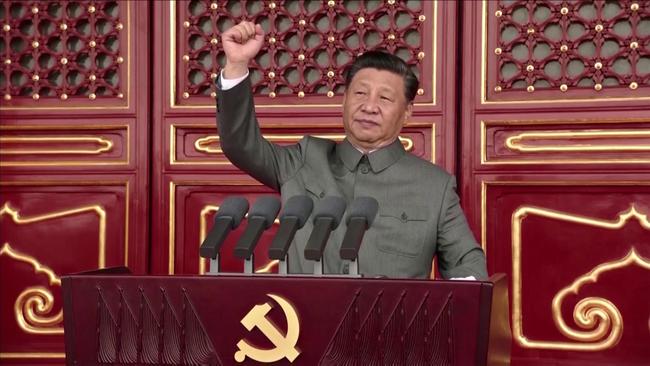The history China wants you to forget
Famine, purges, Tiananmen: the CCP is obsessed with the past but its centenary celebrations suppress some defining moments.

In a speech about history it was the omissions that were most memorable. Chinese President Xi Jingping chose to mark a century of the Chinese Communist Party by glossing over some of the country’s most painful moments.
“We must learn from history to build the future,” he said several times as he exhorted his audience on Thursday to follow the party into a new century and assemble a world-class army. Missing from his reflections were any lessons from the party’s purges, the Tiananmen Square massacre or the Great Famine. Instead, Mr Xi invoked a history of international humiliation, poverty and struggle to rouse the Chinese people and bolster party support.
“The victory of the new democratic revolution put an end to China’s history as a semi-colonial, semi-feudal society, to the state of total disunity that existed in old China, and to all the unequal treaties imposed on our country by foreign powers and all the privileges that imperialist powers enjoyed in China,” he said in an hour-long speech.
No political party in the world puts as much emphasis on history as the Communist Party of China, which derives its legitimacy from the past. The party keeps tight control over accounts of its rule, airbrushing out episodes of brutality in an effort to keep them secret. Any attempt to deviate from the official narrative is described as “historical nihilism” and considered an attack on the party.
Ge Jianxiong, a history professor at Fudan University in Shanghai, warns his students not to dispute the party line. “To discuss modern history is not an academic issue but a political matter to prove the ruling party’s legitimacy,” he said. “Young people and naive scholars should not think of modern history as an academic issue open to free discussions.”
Before this year’s centenary celebrations the party published The Brief History of the Chinese Communist Party. Absent from its 531 pages are the political purges, the Great Famine of 1959 to 1961, myriad uprisings and the ways they were crushed.
When difficult moments are mentioned – take the Cultural Revolution or the more recent Hong Kong protests – they are presented in a way that justifies the party’s actions at the time.
The official narrative labels the 1989 pro-democracy Tiananmen protest as “political turmoil” and calls the military crackdown “a victory that safeguarded our country’s socialist powers, safeguarded the normal societal order and the fundamental interests of the people”.
According to the official account, the Cultural Revolution was part of the “historical period when the party led the people in the painstaking exploration of the road to socialist revolution and construction”. It acknowledges “serious setbacks” but they do not include the tens of millions of lives lost.
Instead the book focuses on the development of infrastructure and medicine. Even the rare admission of its political mistakes is portrayed as proof of the party’s “strong ability” to correct itself.
The book takes the same approach to the 1959-61 famine, turning a blind eye to a death toll that is estimated at more than 30 million. In fact, the official version does not even use the word “famine”. Instead it is called “the three-year natural disaster” or “the three-year difficult time”. It blames the ultra-left, natural disasters and the betrayal of the Soviet government for “unprecedentedly severe economic difficulty”.
Yang Jisheng, a former editor of the now-defunct reformist magazine China Through the Ages, said economic policies including the Great Leap Forward were the direct cause of the famine – exacerbated by the party’s corruption, its failure to distribute reserve grains and its draconian ban that prevented people from fleeing their villages for food. Yang’s book on the famine was banned in China and the magazine folded in 2016, a few years after Mr Xi came to power.
Experts fear that the party will now apply the same indoctrination tactics in Hong Kong; Mr Xi used his speech to vow to exercise “full governance” over the territory and ensure “social stability”.
“The former British territory is learning that under the rule of the party, history is a tool of power rather than collective memory or academic pursuit,” Martin Thorley, a research fellow in Chinese international relations at Exeter University, said.
“Beijing is hoping that in birthdays to come, the Hong Kongers will have learnt to love the party sufficiently.”
The Times



To join the conversation, please log in. Don't have an account? Register
Join the conversation, you are commenting as Logout